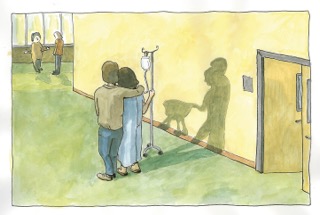Losing a child, even before it is born, is a painful ordeal that is difficult to get over. Florence Malenfant, who lost her baby at 37 weeks, shares with us her own heartbreaking story:
“That is his heart, and there is no activity. I’m sorry.” It’s one of the phrases that’s been swirling around in my head non-stop for a few months now. It’s certainly the last thing we expected to hear that evening.
Actually, when the sonogram technician delivered these words, which were so overwhelming and definitive, she was only confirming what nobody had been able to since we’d arrived at the hospital. But we still had some hope. Indeed, we still do.
It’s just that only five days previously I’d heard this same little heart beating at a crazy and unreal rate. The doctor had felt the baby, to be sure he was lying in the right position. Everything was beautiful. He was perfect. He was growing properly, and moving well, although I’d known some more energetic babies.
“I couldn’t feel him move”
Then, lo and behold, after 37 weeks of carrying him, I couldn’t feel him move at all. As we’d been out and about at the end of that week, we’d been off our usual rhythm. At first, I thought he was just going through a calm period. But my heart did tighten when I stroked my stomach and he didn’t react …
We went to the hospital in the evening, my husband and I, for some reassurance. First of all they thought they’d found his heart, but it was my stressed pulse that they were hearing. Then a resident doctor did a sonogram.
Nobody spoke. A “deathly silence.” That’s a strange turn of phrase … I’d always thought of it as a reference to the dead who made no sound, but today I tell myself that perhaps we’re also speaking about the reaction of people confronted with death.
Basically, nobody spoke. And it dragged on. The resident kept looking without finding anything apparently. After around 10 minutes of inner torture, I dared to say: “What are you actually looking for?” “His heart. I can’t find it. But perhaps it’s just my machine. I’ll get someone to come in and check it properly.” Our hearts had understood, but our brains took a little longer to take it all in, I think. We were still hoping.
They led us to a little room covered in perinatal bereavement posters, and waited for the technician to join us. It was at this moment that we decided to call him François.
We went to collect our two other boys and went home with broken hearts. François was still in my womb, but at the same time, for a reason that eluded all of us, he wasn’t.
We went back to the hospital the next day for the delivery, with swollen red eyes. If they’d taken me to the electric chair I wouldn’t have felt any worse. They were waiting for us.
Our midwife joined us a little later to be with us. And the hours, the numerous hours that followed, were of an unimaginable intensity. We cried, obviously, but we also laughed a lot too. We chatted. We prayed, and we cried once again.
I thought of the Virgin Mary at the foot of the cross. I thought of everything she’d been through, too. I said to myself that she had carried and loved that son who was sacrificed right in front of her. That she had said “yes” some 33 years beforehand, without knowing what was lying ahead, and that she had practically no say in what happened next.
Read more:
How the Holy Rosary brought me real comfort after a miscarriage
Delivering my baby
The delivery was long, but it was good that it turned out that way. I needed it. It allowed my body to follow the suffering and pain of my heart. And it left me more time with him as well. Our minutes together were numbered.
And then he was born. Well, he came out.
It was a magnificent moment, just like his brothers before him. We cried with joy, we found him beautiful. The most beautiful. His little feet, his hands, his perfect little mouth … Everything was in the right place. He let us hold him, love him. I couldn’t take my eyes off his little features. I wanted to etch them into my brain, my eyes, forever.
At that moment, we also understood everything — at least, technically speaking. It was a stupid accident, the kind we feel protected from these days; a knot in the umbilical cord that was a little too tight was to blame. We sighed, full of bittersweet relief.
We were able to keep him with us for a while. Long enough for him to meet our families, for them to see him, so that this child was real for them too. And then we left. We left the hospital without a bump, without a baby. With empty arms. With a hole in our hearts, and souls that had aged 1,000 years. But still, full of hope.
We’re already seeing the real fruits of François’ brief time with us and his premature departure. It’s another mystery — this mission that he’d been given on earth, even though he never got the opportunity to open his eyes.
I’m still often choked with sadness and anger. Sometimes I find it unjust that we had to lose our son so that others could find their faith — yes, it’s happened! — or see God in the event of his death.
Then, I think again of Mary. Her “yes” from the beginning, from the conception of her Son, was a “yes” to the fact that the child didn’t belong to her. If they had asked the Blessed Mother’s opinion before nailing Jesus to the cross, I dare to imagine that she would have taken His place. And nothing would have been the same for humanity …


Read more:
Finding the gift in everything … even after miscarriage

Read more:
Mom saves her unborn baby thanks to God … and an app
Florence Malenfant (text) and Gabriel Bisson (illustrations) live in the heart of a little village with their two boys. She is passionate about art history, audacious recipes, and foreign documentaries. He is a full-time engineer, a part-time comic book artist, and a daddy during the good and the hard times.
This article was first published on Le Verbe. It has been translated and/or adapted here for English-speaking readers.

